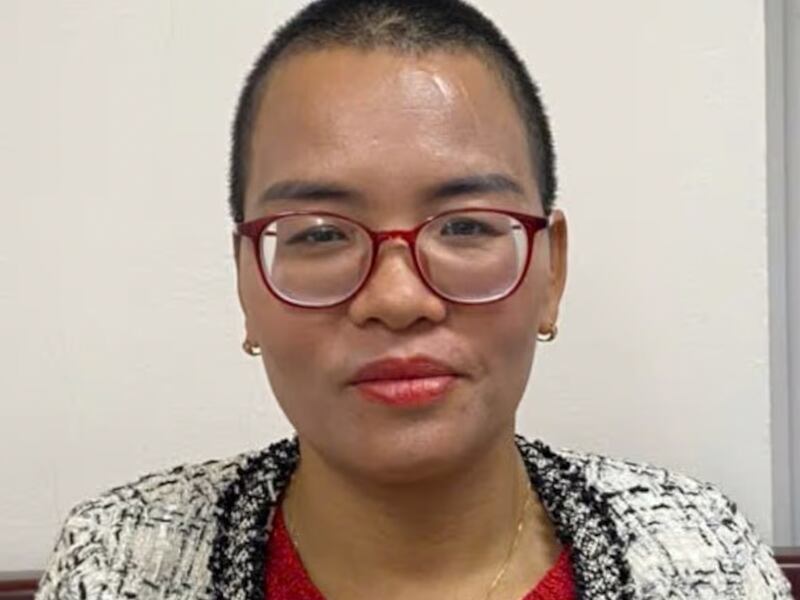Read more on this topic in Vietnamese.
Dau Thanh Tam, a Vietnamese campaigner against corruption in hospitals, has been arrested for criticizing strict new traffic rules, state media reported.
Tam was charged Thursday with “abusing democratic freedoms to post false information” under Article 331 of the Criminal Code for her social media posts, the first arrest since the rules were introduced at the start of the year, the Tuoi Tre news site said.
The Hanoi Police Internal Political Security Department said Tam frequently posted video clips on TikTok and Facebook criticizing treatment at Hanoi hospitals but had recently started posting clips about the new traffic rules under Decree 168.

The police accused Tam of inciting people to protest against Decree 168 which faces widespread public criticism because fines have risen sharply and stricter rules are making life tougher for taxi, delivery and long distance freight drivers, while traffic conditions have not improved.
“Dau Thanh Tam is one of the people who really trusts [Communist Party General Secretary] To Lam and is hoping to help the party and the state to address outstanding issues for a better life for the people.” former prisoner of conscience Dang Thi Hue told Radio Free Asia. “She is not completely a dissident, or fighting for societal change like some other dissidents.”
The Facebook page Thanh Tam Dau has 43,000 followers. Posts include video clips in which Tam talks about topics such as environmental pollution caused by garbage incineration, or criticizes Deputy Prime Minister Tran Hong Ha’s failure to deliver justice to those who suffered from the effects of pollution caused by a 2016 spill at a steel plant operated by the Formosa Plastics Group.
In a video clip posted on Jan. 12, Tam said thousands of people who visited her Facebook and TikTok pages opposed Decree 168 because the high fines were not appropriate given people’s income and living standards, and the poor state of transport infrastructure. State-controlled Vietnam Television reported that “99% of people agreed” when the decree was issued.
RELATED STORIES
Vietnam punishes social media poster for complaining about traffic rules
Vietnamese man fined for social media comments on new hefty traffic fines
Tough new traffic fines anger Vietnamese
The government has said Decree 168 would restore traffic safety. The deputy director of the Traffic Police Department at the Ministry of Public Security, Col. Pham Quang Huy, told state media that three weeks after the new rules were introduced the number of accidents, injuries and deaths had fallen.
Although Tam is the first person to be arrested for criticizing the rules at least two people have been questioned by police, forced to delete social media posts, fined and ordered to sign pledges not to reoffend.
“[Vietnamese authorities] consider all voices critical of Decree 168 to be hostile and use national security laws and provisions to punish them,” said lawyer Nguyen Van Dai who lives in exile in Germany. “The arrest of Dau Thanh Tam is part of their broader efforts to crack down on dissenting voices and opposition to Decree 168.”
New restrictions
On Thursday, Project88 – which monitors human rights in Vietnam – released a report titled New restrictions on freedom of expression in Vietnam.
The group said that after taking control of the Communist Party in 2016, hardliners issued numerous resolutions to maintain the party’s political monopoly, establishing a nationwide network of opinion-shapers to control online discourse.
The government has been quick to act, passing laws such as the Cybersecurity Law, the Press Law, the Information Technology Law, and the Telecommunications Law, and many decrees to control online speech and traditional media.
These laws built on an existing framework of criminal penalties under Articles 117, 155, 156, 200 and 331 of the Criminal Code.
Project88 argues that many of the new policies violate human rights law, are too broad, and contain vague language that allows government officials to decide which topics are off-limits.
Although Vietnam is a member of the United Nations Human Rights Council and publicly commits to protecting freedom of expression in its constitution and in numerous human rights agreements, “Vietnam has stepped up efforts to suppress freedom of expression,” Project88 said.
Translated by RFA Vietnamese. Edited by Mike Firn.
